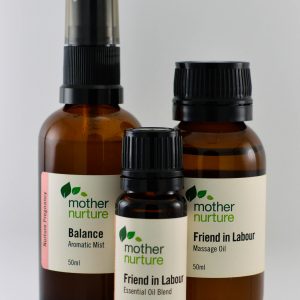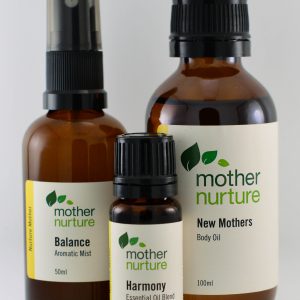Aromatherapy for Pregnancy, Birth and Beyond
In this blog, I am excited to welcome our special guest writer, Sonya Edmonds. Sonya is a Clinical Aromatherapist and a Registered Nurse and Midwife who is an absolute wealth of knowledge when it comes to aromatherapy; particularly when used in pregnancy, postpartum and with infants and children. The populist and widespread use of essential oils has literally exploded in the last few years, and while increased awareness of the benefits of aromatherapy is great, it is very important to understand how and when to use them safely – especially if you are pregnant or breastfeeding.
Make sure you read to the end to find out how you can win a fantastic aromatherapy gift pack from Sonya’s amazing range, Mother Nurture.
Pregnancy brings many changes: physically, psychologically and socially. This is a time when many women turn to complementary therapies, including aromatherapy.
However, then follows the question “is this safe for me; is this safe for my baby?”
While I encourage the use of aromatherapy to help enhance wellbeing during pregnancy, there are some safety aspects to consider. Essential oils are volatile, odorous substances found in various parts of particular plants. Yes they are natural, but they are also very concentrated. This is why it’s so important to understand safety aspects involved in their use and that often “less is more”.
How can aromatherapy help during pregnancy and birth? Does it work?
Nurturing care during this special time provides benefits for both mum and baby. Aromatherapy played a big part in relieving some of my own pregnancy related discomforts, easing through birth and helping maintain my sanity in the early postnatal period – and just about every day since! Aromatherapy, often combined with massage, can be beneficial during pregnancy in the following ways:
* May help to alleviate common discomforts such as nausea, muscular complaints, varicose veins, haemorrhoids, pruritis (itch), fatigue, insomnia and emotional upsets.
* To help maintain good general health through regular use of essential oils; prevention and early treatment of infections.
* Support your pregnancy through reduction of stress and ensuring good sleep patterns.
* Any aromatherapy treatment, whether given by a professional, partner or the woman herself is an act of nurturing, essential for all pregnancies.
* Preparation for labour, both physically and psychologically.

There is a growing body of research and anecdotal evidence on the benefits of essential oils during pregnancy and birth. For example studies have shown essential oils such as lemon and peppermint to be useful for nausea and sweet orange to reduce anxiety in labour. The Oxford Radcliffe hospital in the U.K. carried out the largest study ever done on the use of aromatherapy within a health care setting. 8,058 mothers were involved in the study to examine the contribution of aromatherapy in promoting maternal comfort by:
- Helping to reduce anxiety and fear
- Alleviating pain
- Assisting contractions
- Alleviating nausea and vomiting
There were some very positive findings which have led to aromatherapy being incorporated into many birth centres in the U.K. and around the world.
Back to the question of safety
A wide variety of misinformation and conflicting advice has lead to confusion about essential oil use in pregnancy and often women choosing not to use any essential oils at all. There are some essential oils which should not be used, or used with caution, during pregnancy. Many of these oils are not readily available so it’s easy to avoid them. The majority of basic essential oils that are readily available are safe to use. It is more about the method of application and dosages used. Consider the following general guidelines:
- Ensure you are using good quality essential oils from a reputable supplier.
- Never take essential oils via oral, rectal or vaginal route.
- The essential oils that carry some risk need to be avoided or restricted throughout pregnancy, not just during the first trimester. *
- Dilute essential oils before applying to the skin. For massage over large areas of the body use a maximum concentration of 2% essential oil (i.e. 4 – 6 drops per 10mls carrier oil). Appropriate carrier oils are cold pressed vegetable, nut or seed oils such as sweet almond, macadamia or sesame oil.
- When adding essential oils to the bath always blend in a dispersant before adding to the water. If you don’t have a dispersant mix the essential oils into a tablespoon of vegetable oil or shower gel and then disperse into the water.
- Inhalation of essential oils, such as in a vaporiser or on a tissue, carries much less risk but still err on the side of caution regarding how much you use. Also remember a woman’s sense of smell is often much more acute during pregnancy.
- It is preferable to consult a professional aromatherapist for advice and guidance, especially if you have chronic health issues, a history of miscarriage or any pregnancy related concerns.
- Let your health practitioner, doctor, midwife or obstetrician know about anything you are using or proposing to use.
*For a list of these essential oils go to https://www.mothernurture.net.au/safe-use-aromatherapy-pregnancy/

What about essential oil use when breastfeeding?
Aromatherapy can also be valuable in supporting new mothers as they recover from birth and adjust to the demands of motherhood. Some caution is advisable when using essential oils while breastfeeding. Due to the lipophilic (fat loving) nature and low molecular weight of essential oils it is expected that essential oil compounds will be absorbed into breast milk to some extent. Estimated exposure of these constituents in breast milk is less than 1% of the maternal dose. However, once again it is all about how the essential oil is used.
The above guidelines for aromatherapy use in pregnancy also apply during breastfeeding. Also, consider the importance of newborns being able to recognise the scent of their own mother.
Is it necessary to seek advice from a qualified aromatherapist?
Most pregnant women and new mums will be able to use essential oils safely and effectively by following the above guidelines. However, aromatic remedies tailored to the needs of the individual will usually give better results. This is because clinical aromatherapy is a holistic therapy addressing the physical and psychological needs of a person.
I would recommend consulting a professional aromatherapist for advice and guidance if you have a history of miscarriage, chronic health issues or experienced any problems during your pregnancy. A qualified practising aromatherapist will belong to a professional association such as IAAMA (International Aromatherapy and Aromatic Medicine Association: www.iaama.org.au )
Take home messages:
- Essential oils are valuable, natural and very potent plant medicines.
- When used with care and respect they can be very useful during pregnancy, birth and the postnatal period.
- Remember, and rather than repeat myself, I’m quoting Paracelsus, a Swiss-German alchemist from the 1500’s: “the dose makes the poison”.
- When in doubt always consult a qualified professional aromatherapist.
*** YOUR CHANCE TO WIN! ***
Sonya is offering one lucky winner the chance to win a stunning aromatherapy kit from her
Mother Nurture range.
Select either the Nurture Pregnancy or Nurture Mother gift set (see images above). To enter, please send an email to info@birthwellbirthright.com and tell us which kit you’d like to win and why! Competition closes September 30th at midnight (AEST).
Competition open to Australian residents only.
About the author:
 Sonya holds a Diploma of Clinical Aromatherapy and Massage, is a Registered Nurse and Midwife, Certified Infant Massage Instructor and mum to two daughters. She is passionate about the natural healing properties of essential oils and has over 16 years’ experience in using aromatherapy to promote health and wellbeing. Drawing on her qualifications, experience and passion Sonya founded Mother Nurture Aromatherapy and Massage to cater for mothers, mothers to be and their families. She also has a strong interest in women’s health. Sonya is a full member of IAAMA (International Aromatherapy and Aromatic Medicine Association) and practises at two Melbourne locations.
Sonya holds a Diploma of Clinical Aromatherapy and Massage, is a Registered Nurse and Midwife, Certified Infant Massage Instructor and mum to two daughters. She is passionate about the natural healing properties of essential oils and has over 16 years’ experience in using aromatherapy to promote health and wellbeing. Drawing on her qualifications, experience and passion Sonya founded Mother Nurture Aromatherapy and Massage to cater for mothers, mothers to be and their families. She also has a strong interest in women’s health. Sonya is a full member of IAAMA (International Aromatherapy and Aromatic Medicine Association) and practises at two Melbourne locations.
